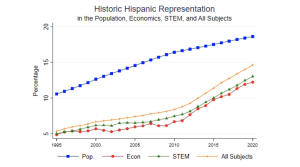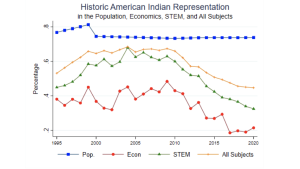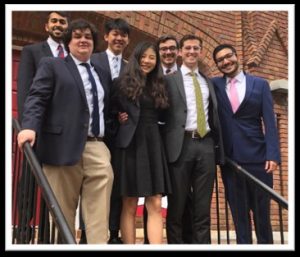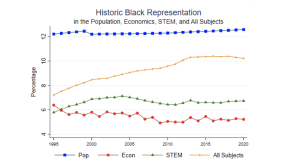Commitment to Underrepresented Students interested in Economics
The Department desires to promote inclusion of all students who wish to study economics. Yet we understand that our profession’s current make-up does not reflect the American melting pot.

As economists we recognize that each student chooses an academic major(s) and that the observed outcome maximizes that individual’s discounted value of expected lifetime utility. Individual preferences are an important part of major selection. While preferences are one component, there are other aspects of decision-making such as constraints and expectations and, of course, the supply side of the market. The economics department is the supply side when it comes to economics training, and we are responsible for providing a desirable and useful product. And, to the extent that the economics department also plays a role in shaping preferences, constraints, or expectations, we hope that our part is positive and informational.
How can we help you see yourself as an economist?
Recent research finds that the demographics of instructors and the underrepresentation of women and persons of color among both real and fictional people mentioned in economics textbooks may be particularly impactful in affecting female and minority participation in economics early on in the pipeline.[1]
Table 1 reports the share of women in Ph.D.-granting departments at different ranks in 2019 (CSWEP Report, 2021) and analogous figures from our department. Our department’s figures are for graduates in 2020 and faculty and new students as of fall 2022.
Table 1: Share of Women in Ph.D.-granting Economics Departments and the UNC-CH Economics Department by rank/group (2021)
| Group | Ph.D.-granting Economics Departments | UNC-CH Economics Department |
|---|---|---|
| Declared Economics Majors | 34.4 | 34.1 (=435/1273) |
| Graduating Economics Majors | 34.7 | 33.5 (=130/388) |
| Entering Ph.D. Cohort | 38.4 | 40.0 (=6/15) |
| New Ph.D.s | 32.8 | 11.1 (=1/9) |
| Non-tenure-track Professors | 40.1 | 66.7 (=4/6) |
| Assistant Professors | 32.6 | 33.3 (=3/9) |
| Associate Professors | 28.1 | 20.0 (=1/5) |
| Full Professors | 15.5 | 18.8 (=3/16) |
Figure 1: Historic Minority Representation among Economic Degree Recipients Figure 1 depicts the share of minorities (Black, Hispanic, and American Indian) among degree recipients in Economics, STEM, and all fields. Among U.S. institutions who participated in the CSMGEP 2021 survey, about 8.2% of Economics faculty are Black, Hispanic, or American Indian, across all ranks. Currently at UNC-CH, 13.3% (= 4/30) of our tenured faculty members in the Economics department are Black and/or Hispanic.
Figure 1: Historic Minority Representation among Economic Degree Recipients


Note: Data are from the Integrated Postsecondary Education Data System (IPEDS) at the National Center for Education Statistics (NCES) for all U.S. Institutions and represent all degrees (BA, MA, PhD) awarded among U.S. citizens or permanent citizens in 2021. Source: Report from the Committee on the Status of Minority Groups in the Economics Profession (CSMGEP).
In 2021, our 1551declared Economics majors (1325) and e-minors (226) represented 10.9% of the College of A&S enrollment.
Among those majoring in economics (1325), 68% (785) declared economics as their first major. Since 2019, we have see nan increase in freshmen declaring Economics as their major. And the number of BS majors has climbed to 261 (20%).
While the race of 9% of our majors is either unknown or two or more (unspecified) races, 3.5% are Black, 5.8% are Hispanic, and 11.4% are Asian. Economics attracts proportionately fewer Black and Hispanic students and more Asian students relative to the composition of those students in the College of A&S (8.7%, 8.7%, and 11.3%, respectively). We encourage students of color to explore what economics has to offer.
Relative to all A&S students, we have similar proportions of first-generation students (12.6% vs 15.0% in A&S), with significantly fewer students facing financial need (29.8% vs 42.2% in A&S) and larger proportions of students from out of state (26.5% vs 16.7 in A&S).
Other interesting data facts show that while 96.1% of our majors participated in a research-intensive course (vs 69% in all A&S majors), only 6.6% of our majors participated in mentored research (vs 17.3% in A&S). These data reflect the importance of training and a good foundation in economics, and suggest an area of improvement, namely promoting our opportunities for mentored research experience.
We encourage students who have an interest in economics to talk about that interest with any of our faculty members. The department can host events with students and faculty, but we hope you will seek us out as well. We are eager to share with you our excitement about the questions one can explore using economic insights and methods. Tell us about your interests. Ask us about our research. While we may talk about our work and that of other economists in our courses, course content and objectives sometimes constrain the time available for fully sharing. Don’t be a stranger; visit us during our office hours.
The Department of Economics at UNC-CH endorses the American Economic Association (AEA) Code of Professional Conduct, as adopted by the AEA on April 20, 2018. We encourage interested individuals to review the AEA Code of Professional Conduct. We also provide a link to the AEA’s recent (June 5, 2020) statement from the executive committee.
What can you study as an Economics Major at Carolina?
The Economics Department has always offered a solid foundation in economic concepts (ECON 101, 400, 410, and 420) that allow students to explore additional subjects in more detail in their elective (400-level) and capstone (500-level) courses. In recent years we have expanded our offerings to meet the demands from the employment market for particular skills as well as the desires of students to pursue different applications of their knowledge.
Our Undergraduate Degrees: Which degree is best for you depends upon your gifts, your interests, and your goals.
- Bachelor of Arts (B.A.): We continue to offer the Bachelor of Arts (B.A.) degree for students who want to focus on the analytical approach to explaining social phenomena. Upon graduation, some students plan to enter the workforce. Other students plan to pursue a graduate or professional degree in law, medical school, business administration, public affairs, education, or international studies. The B.A. in economics has the flexibility to allow all of these students to pursue a demanding major in a social science, to take related and complementary courses outside our department, and to be prepared for employment in a variety of areas.
- Bachelor of Science (B.S.): The new major provides students with greater exposure to data analysis and quantitative techniques. The additional quantitative course requirements give these students a taste, at the undergraduate level, of the profession’s emphasis on economic theory, statistics, and data analytics – characteristics of increasingly-quantitative jobs or graduate study in economics. Students taking courses in mathematics, computer science, and other sciences may wish to explore the B.S. in economics as a way to apply their quantitative skills.
Recent Course Additions:
In addition to our foundational courses and traditional elective courses in the areas of microeconomics, macroeconomics, econometrics, international/development economics, and applied microeconomics (labor, health, industrial organization), we have introduced in the last four years several courses that demonstrate the breadth of application of economic thinking. These new courses include:

ECON 415: Market Failures
ECON 416: Behavioral Economics
ECON 455: Environmental Economics
ECON 486: Gender and Economics
ECON 490: Urban Economics
ECON 490: Exploring the Economics of Global Pandemics
ECON 522: Topics in Macroeconomics: the Labor Market
ECON 550: Advanced Health Econometrics
ECON 551: Economics of Education
ECON 573: Machine Learning and Data Science
ECON 586: Economics and Life
What extra-curricular opportunities and resources are available for students?

Faculty-mentored Funded Summer Research:
Underrepresented Majors (URM) Fund
Mayo Fellowship
Guest Fellowship
 Student-envisioned Experiences:
Student-envisioned Experiences:
Underrepresented Majors (URM) Fund
Adventures in Economics
Enrichment Opportunities (see “Extracurricular Activities in Economics” on linked page):
Carolina Economics Club
Women in Economics
UNC Fed / FPIC Challenge
Minors and Credentials:
DATA Science Credential
Entrepreneurship Minor through the Shuford Program in Entrepreneurship
Philosophy, Politics, and Economics (PPE) Minor
Study Abroad Programs
UNC faculty-led programs: Croatia and Scandinavia
Courses at other approved programs
Exchange Programs
Singapore: National University of Singapore
Russia: St. Petersburg State University of Economics
Office hours with Instructors
Undergraduate Learning Assistants
Peer Tutoring Program
EconAid Center
Job Market Resources:
One-credit Course in Career Preparation for ECON majors (ECON 292)
Economics Department Advisory Board
Job and Internship Opportunities
[1] Hale, G., & Regev, T. (2014). Gender ratios at top PhD programs in economics. Economics of Education Review, 41, 55-70. Carrell, S. E., Page, M. E., & West, J. E. (2010). Sex and science: How professor gender perpetuates the gender gap. The Quarterly Journal of Economics, 125(3), 1101-1144. Fairlie, R. W., Hoffmann, F., & Oreopoulos, P. (2014). A community college instructor like me: Race and ethnicity interactions in the classroom. American Economic Review, 104(8), 2567-91. Stevenson, B., & Zlotnik, H. (2018, May). Representations of men and women in introductory economics textbooks. In AEA Papers and Proceedings (Vol. 108, pp. 180-85).
